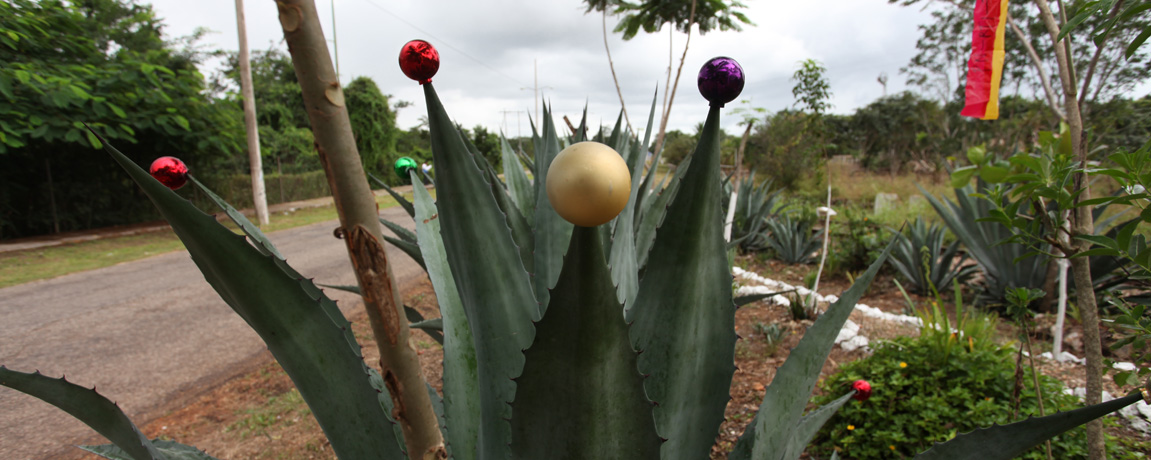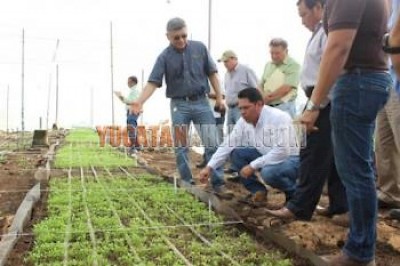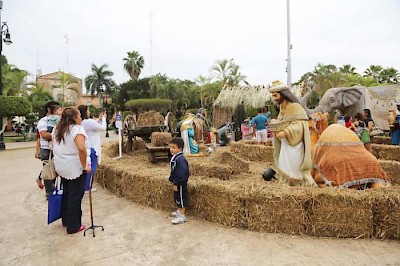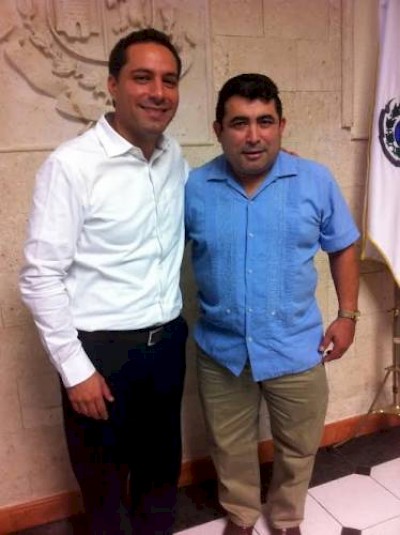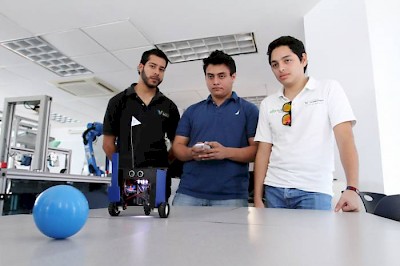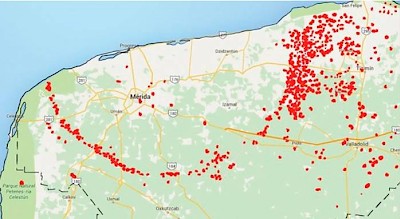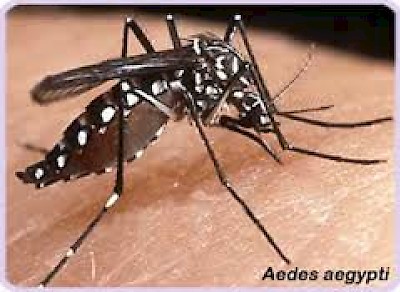Yucatan News: Rosy and the Robots
Teenage Pitcher Breaking Gender Stereotypes
Right here in Merida, some serious gender stereotypes are being brought into question in the world of baseball. Rosy Maria del Castillo is 18 years old, stands only 5'6" tall and has a 78-MPH fastball. Rosy now plays for the Azulejos of Tamanche, a semi-pro baseball team in the Yucatan in the Liga Meridana. Her pitch may be slower than the average male, but she is good enough that she had two strikeouts in only her second game two weeks ago. According to a few articles we read about Rosy, her teammates were initially surprised to be playing with a woman but they have gotten used to the idea quickly. Rosy hopes to get a scholarship to learn sports marketing and would love to get a contract to play baseball in Japan. There is nothing written that says that women cannot play baseball, but traditionally good players have been steered into softball. Rosy says she has played both, but baseball is her passion. Good luck, Rosy! We think you have a great future ahead.
Ricky Martin?
There are rumors flying around that Ricky Martin is going to be the main event, or plato fuerte in the local vernacular, at next year's Carnival. Mr. Martin's press people are denying his involvement at the moment, but that doesn't keep the rumours from flying. For the record, Carnival will be held from February 3 to February 10 at the Xmatkuil Fairgrounds in 2016. Make your plans accordingly!
Shelter Uproar
This week, a team of vets, volunteers and representatives from Yucatan's Ministry of Health made a planned visit to the Evolucion Animal Shelter in Uman. The purpose of the visit was to investigate a denuncia that had been filed against the shelter for the mistreatment or neglect of animals under their care. The purpose was also to inspect each animal and make an assessment as to the health of the animal, and any treatment that the animal might need to reach a healthy state. Reports about this visit were published on Yucatan Living and in other outlets (we have since removed our article), occasioning an uproar in the Merida community. Community members were either pleased that something was being done and the situation was being discussed, or upset that the shelter was being "attacked". There is no doubt that Evolucion has done wonderful work, placing many dogs and cats over the years. There seems to also be no doubt that the shelter now holds more animals than it can care for responsibly, and something must be done. We look forward to the report from the vets and to whatever the community can do to help. We encourage people to focus on efforts to educate people to adopt a dog instead of buying one, as just this change in behavior could make a huge difference in Merida and throughout the Yucatan.
Toys for Kids with Cancer
The larger public hospitals in Merida provide much of the specialty care for children throughout Yucatan and surrounding states. They provide excellent care for children who suffer from cancer, as well as support for their families as they travel to Merida, Mexico City, and Queretaro’s HITO for state-of-the-art care. The Fundacion AITANA is an organization based in Quintana Roo. However, they have a new Christmas campaign that is going to give a brand new toy to every “cancer kid” in hospitals O’Horan, ISSSTE and IMSS as they spend what must be a very scary Christmas far from home. Everyone is invited to contribute to this cause and show these little cancer patients that they are safe in the arms of Merida. To participate in this program, call Lupita Duran (999) 368-9389, visit the Fundacion AITANA website, or find Lupita Duran on Facebook.
Cilantro and Coriander in Ixil
There are agricultural projects going on all across the State of Yucatan. This week, we find out about new research into the growing of cilantro and coriander for export from Ixil. If you remember, last year, these same farmers made their mark with four species of habaneros. Next came coriander, and now cilantro. Their 120 hectare fields are located in the municipalities of Ixil, Sacalum and Chicxulub Pueblo, where farmers are working on using a number of new technologies that will make them competitive in a world market. In fact, these specific farmers are engaged in the parallel activity of developing a trajectory for agricultural pilot projects for any crop. That’s a tall order for these rural farmers, but we are looking forward to the day when “Product of Yucatan” is on more than a few items in international grocery stores. Congratulations on their success thus far, and best wishes for a successful New Year!
The Guadalupanos Are Still Here
Although protected routes and streets closed to vehicular traffic were only available for the guadalupanos on the eve of December 12, please note that the pilgrims will be in the area for as long as several more weeks. This year, at least one report tells us that some of the guadalupanos will be with us until Three Kings’ Day. Accidents happen every year, and this year has been no different. Hopefully, there will be no more injuries or deaths during the rest of the time these pilgrims are with us. Please drive carefully.
New Nativity Scene in Plaza Grande, Merida
A life-size nativity scene, eight by eight meters in size, has just been added to the decorations in the Plaza Grande of Merida. It is a beautiful addition to the area and will be on hand for the public to enjoy until January 3. When the City of Merida made this announcement, they gave away the date for the beginning of the Anniversary of the City of Merida. That weeks long party will begin on January 3 this year. It usually doesn’t begin until January 6 (Three Kings’ Day), but Carnival is early this year so look for more than a few winter events to happen earlier than usual.
Yucatan’s First 3x1 Group Approved
Everyone is used to the remittance program known as 2x1, in which local and state governments match the pooled remittances of workers who have gone, mostly, to the United States and Canada to work. The 3x1 program simply means that the group of workers usually belong to a formal club, are able to invest in much bigger projects, and their funds are matched by local, state and federal pesos. Until now, the 2x1 projects have been limited to ball fields, parks, a few communal bathrooms in outlying villages, and a bit of street maintenance. Times have changed. Today, 49 clubs represent 48,000 Yucatecos from Oxkutzcab, Tekax, Ticul, Cenotillo, Dzan, Santa Elena, and Muna. These 49 clubs have banded together as the Federation of Clubs of Northern California Yucatecos. San Francisco, California’s 8,000 strong Club of Merida Migrants is the driving force leading to a brand new agreement that, under the 3x1 program and for the first time, migrants outside of Yucatan will be able to invest in infrastructure and public works projects beginning in 2016. This kind of power, after long years of struggling to organize and become the entities they are today, brings these migrants the level of respect they have deserved for a long time. We hope that every year, from now own, will see the migrant clubs of Yucatan moving forward to a wonderful future.
Archaeology Win Over Wind Turbines
Everyone was thrilled when it was announced that the State of Yucatan is to get a 1,350 hectare field of wind turbines in the central portion of the state. However, as the impact studies got underway, it was learned that there are at least 5,088 Maya sites in that area that must be preserved. One of them has megalithic structures on it, with stones up to 1.20 meters long, 80 centimeters wide and 80 to 90 centimeters deep. The actual size of these sites is unknown, but we do know that a certain amount of area must be left open around each. So – the wind turbine project is on hold until a thorough examination can be made of the area. Once that is done, a new plan will be drawn up and the wind turbine project will continue.
Team of Three Wins Robotic Contest
When all was said and done, it looks as if this robotics contest was actually won by TecMilenio Yucatan University. Not only did the team of three who won the contest come from there, but another team of 16 also won another 100,000 pesos to take Yucatan’s robotic accomplishments to competition nationally and internationally. What makes the students from this university so talented? One part may be innate talent, but another part is their school director and faculty, who all stress such human values as respect, teamwork and innovation. Congratulations to everyone who participated in this event.
Sports Tourism Growing in Yucatan!
When a group of 5,000 people show up in a city to participate in one event, the Ministry of Tourism sits up and takes notice! That’s what happened during the celebrations of the Day of the Dead. The Merida Rock’n’Roll Half Marathon drew 5,000 runners from around the globe. Now, we discover that this is a trend that has steadily been growing throughout the state. Progreso has several marathons each year, Merida has one, Izamal has one, and there is a local run between business owners, politicians and the public every Sunday in Merida. In all, there are almost 260 runs per year in the State of Yucatan and almost every one of these runs is for the benefit of one charity or another. Yucatan has the routes and venues, and has all of the stores necessary to purchase any equipment one could possibly need. To learn more about upcoming races, visit Activate! http://activate.com.mx/2014/index.php/running Add everything from tango, salsa and contra dancing to fishing tournaments, weight lifting, golf, high diving, baseball, soccer, boxing, and zip lines over cenotes and what you have is fertile ground for Sports Tourism. …and then, of course, there is the sport of swinging in your hammock, on the beach, with a good book and a tall drink. Either way, there’s always something to do in Yucatan.
UADY Study of Pollution in Yucatan’s Cenotes
As we all know, the Chicxulub Crater is more than 180 kilometers (110 miles) in diameter, with its center just off the coast of Chicxulub Puerto. Today, there is a ring of cenotes running along the outer edge of the crater, approximately 90 kilometers inland. Unfortunately, the land around those cenotes is used for commercial farming and for raising livestock. This is how pesticides and heavy metals are washed, unfiltered, into the underground water. This area is also the home of most of the Maya of Yucatan. The ultimate outcome is such statistics as UADY’s finding that 81% of breastmilk samples among Maya women in Yucatan test positive for organochlorine pesticides. Of the 106 municipalities (counties) in Yucatan, 32 show levels that are sufficient to affect the reproductive system and are classified as carcinogens. In addition, 30% of the Maya population drinks water from those cenotes. Scientists are calling for more research, so they can pinpoint the source of the contamination; then remediation and huge fines if it happens again. This research will continue and something will be done about it. Time and time again, we have seen that Yucatan loves her own and will do whatever it takes to protect it.
Mexico Registers First Dengue Vaccine
The World Health Organization (WHO) estimates that 40% of the world’s population is at risk for contacting any of the various forms of dengue fever. WHO issued the call to develop the vaccine in 2011. By 2013, it was done (by the French pharmaceutical company Sanofi Pasteur) and went into 25 clinical trials, with more than 40,000 participants in five different countries. Wednesday, December 9, 2015, the vaccine was registered in Mexico City by the Health Ministry of Mexico. This was truly a global exercise in working together toward a common goal. Unfortunately, this vaccine is not for children under the age of nine years, but that may change in the future. Many thanks to each and every scientist and study participant who worked on this project, as well as to the governments that helped finance it and make it possible. Now, while we wait for the vaccine to become available, all of us need to clean those patios so mosquitoes have nowhere to hide.




